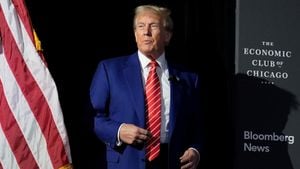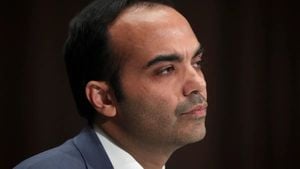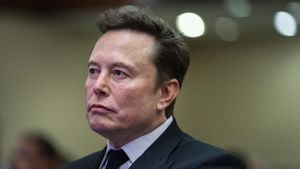UK's political scene has been buzzing recently, with key developments capturing the attention of the public and political analysts alike. The confirmation of significant arrests linked to the Channel boat crisis has sent ripples through the Labour party as they attempt to redefine their strategy amid shifting narratives and comparisons to the recent U.S. elections.
Sir Keir Starmer, Labour's leader, spoke out about the "substantial" arrest of an individual believed to be involved in the supply of small boats for unauthorized Channel crossings. This incident aligns with the government's tougher stance on immigration, drawing parallels to similar themes promoted by former U.S. President Donald Trump. Political insiders suggest Starmer is strategically steering Labour back to core issues such as immigration and economic growth, hoping to resonate with voters as these topics seem to be dominating current political discourse.
On another front, Chancellor Rachel Reeves took the stage at the Mansion House, aiming to woo the City of London's financial community. She criticized the regulations imposed after the 2008 financial crash, labeling them as overly cumbersome and not conducive to growth. Reeves highlighted the unintended consequences of such regulations and stressed the need for the UK to maintain its status as a global financial hub. According to her, the UK has been focused more on regulating risks rather than promoting growth, which is antithetical to driving economic resilience.
Reeves revealed plans to instate "growth-focused remits" for financial regulators, aiming to strike a balance between stability and lending capabilities among British banks. She emphasized the importance of these regulatory reforms to bolster investment confidence in the nation's economy as it faces increasing competition from abroad.
Meanwhile, debates around assisted dying are heating up within government ranks. Liz Kendall, the Secretary of State for Work and Pensions, recently expressed her support for the assisted dying bill, joining other senior Labour figures like Health Secretary Wes Streeting. The government has opted for a free vote on the contentious issue, allowing MPs to cast their votes based on personal conviction rather than party lines. Kendall remarked, "I've always believed in giving people as much choice and control as possible... I believe it's really important to give people choice and control." This bill marks a significant shift toward personal empowerment over life choices.
Conversely, the government is facing critique over its recent tax policy affecting farmers. The introduction of a 20% tax on inherited farming assets exceeding £1 million has caused backlash from agricultural groups who argue it is unfair and will impose hardship on the farming community. Former Conservative adviser James Starkie pointed out the communication issues the government faces and suggested this situation presents the Conservatives with the opportunity to win back support from farmers, who feel increasingly alienated.
The political arena is also witnessing strong responses to the recent narrative influenced by the U.S. elections. Some proponents believe the recent Trump victory could serve as a "blessing in disguise" for Labour. Political commentators assert this outcome might push Labour to return to focusing on contrasting economic strategies and immigration policies rather than the more progressive, left-leaning attitudes they had previously embraced, which some insiders refer to as "wokery." There is speculation about how Labour might recalibrate its messaging to connect more effectively with mainstream voters.
While banking regulations have become increasingly strict post-2008 against the backdrop of the financial crash, experts like Angela Knight are urging the government to reassess these constraints. They argue the current rules limit banks' abilities to both maintain stability and offer loans, hindering economic growth. Knight advocated for reforming these regulations to produce desired outcomes without compromising financial security.
Debates surrounding the management of recent immigration-related arrests have also highlighted the tensions between differing political narratives. Home Office Minister Angela Eagle asserted the Labour government deserves credit for the recent arrest related to migrant crossings, attributing the collaborative international relations efforts and funding allocations to this success. Critics, though, argue the arrest was largely the result of long-standing investigations conducted by crime agencies.
Lastly, with Chancellor Reeves aiming to dismantle the barriers imposed by financial regulations and Engage with the City of London, the government is heavily invested in redefining UK’s economic policies. This recalibration will certainly influence upcoming political engagements as shifting priorities and themes emerge. Only time will tell how these dynamics will play out as parties prepare for the next election cycles.



